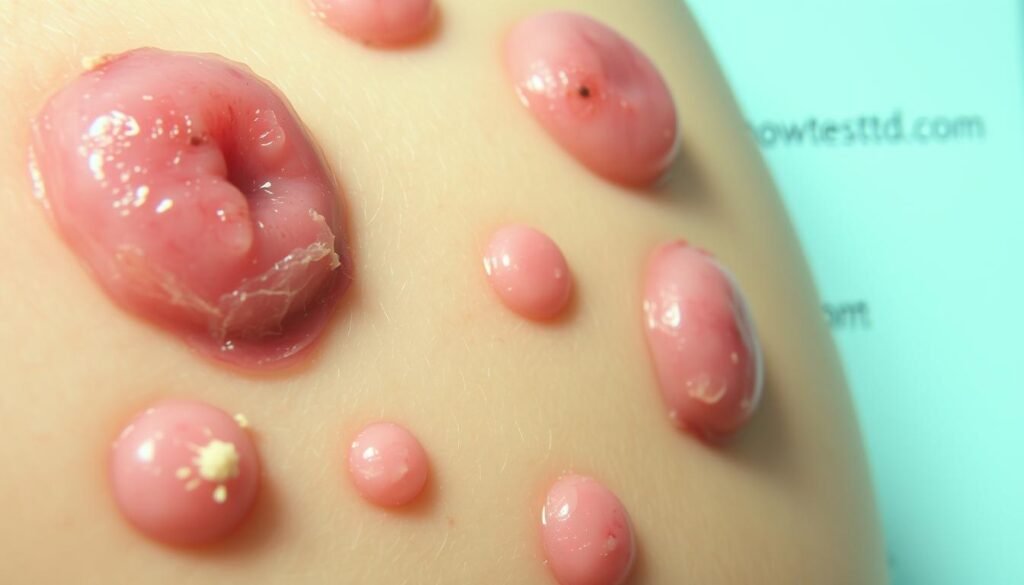Genital Herpes: Understanding the Symptoms
Genital herpes is a common sexually transmitted infection (STI). It’s caused by the herpes simplex virus (HSV). Millions of people worldwide live with it, often without knowing.
Mayo Clinic says some people with the virus have mild genital herpes signs or no symptoms. Yet, they can spread the virus.
It’s important to know the herpes outbreak symptoms. This helps manage the condition and stop it from spreading. Symptoms include pain or itching in the genital area, small bumps or blisters, and painful ulcers.
Being proactive about your health is key. Don’t delay getting tested if you’re worried about your symptoms.
Key Takeaways
- Genital herpes is a common STI caused by the herpes simplex virus (HSV).
- Some people infected with the virus may have mild or no symptoms but can spread it.
- Common symptoms include pain or itching around the genitals and small bumps or blisters.
- Knowing the symptoms is key to managing the condition and stopping it from spreading.
- Getting tested is essential if you’re worried about your symptoms.
What is Genital Herpes?
Genital herpes is a common infection spread through sex. It affects millions globally. The virus behind it is called herpes simplex virus (HSV). HSV has two types: HSV-1 and HSV-2.
The Herpes Simplex Virus Explained
The herpes simplex virus can cause many symptoms. These can range from mild to very severe. After getting infected, the virus stays in your body forever. It sometimes wakes up and causes outbreaks.
HSV-1 vs. HSV-2: Understanding the Difference
HSV-2 mainly causes genital herpes. HSV-1 usually leads to mouth sores. But, both can spread to the genitals through sex.
How Common is Genital Herpes?
Genital herpes is very common. The CDC says about 1 in 6 people aged 14-49 have HSV-2.
| HSV Type | Primary Infection Site | Transmission to Genital Area |
|---|---|---|
| HSV-1 | Oral | Possible through oral-genital contact |
| HSV-2 | Genital | Primary cause of genital herpes |
It’s important to take care of your health. Don’t delay getting tested if you think you have genital herpes. Early treatment helps manage the condition and lowers the chance of spreading it.
How Genital Herpes Spreads
It’s important to know how genital herpes spreads. This virus is very contagious. It spreads through skin-to-skin contact.
Sexual Transmission
Sex is the main way genital herpes spreads. You can get it through vaginal, anal, or oral sex. Even if your partner doesn’t show symptoms, you can get it.
The National Institutes of Health says it’s riskier when your partner has sores or herpes outbreak symptoms.
https://www.youtube.com/watch?v=qDIUes2t9SY&pp=0gcJCfwAo7VqN5tD
Non-Sexual Transmission
Sharing things or touching herpes sores can spread it too. But it’s not as common as through sex.
Asymptomatic Shedding
Asymptomatic shedding means the virus can spread even without symptoms. This is a big problem because people might not know they’re infected.
Staying healthy is key. Get tested regularly and watch for genital herpes rash and symptoms. “Don’t wait to get tested,” is a good rule to follow.
What Are the Symptoms of Genital Herpes?
Knowing the signs of genital herpes is key to managing it well. Genital herpes is caused by the herpes simplex virus (HSV). It shows different signs and symptoms, which might not be easy to spot right away.
Primary Outbreak Symptoms
The first time you get genital herpes, it can hurt a lot. Symptoms include painful blisters or sores, itching, and burning in the genital area. These blisters can burst, leaving ulcers that crust over before they heal.
You might also feel fever, headache, and swollen lymph nodes. It’s important to know these herpes infection signs to get help fast.
Recurrent Outbreak Symptoms
After the first time, the virus stays hidden in nerve cells. It can come back, causing less severe outbreaks. These episodes might have genital herpes blisters or sores, but they’re usually milder.
They might also make you itch or tingle. Knowing these genital herpes warning signs helps you manage it better.
Asymptomatic Carriers
Some people with genital herpes don’t show any symptoms. They can pass the virus to others even if they don’t feel sick. It’s important for sexually active people to get tested regularly.
Being proactive about your health is very important. Don’t delay getting tested if you’re worried about genital herpes or other STIs. Early treatment can help manage the condition and lower the risk of passing it to others.
Recognizing Genital Herpes Blisters and Sores
It’s important to know the signs of genital herpes. This includes blisters and sores on the genitals, anus, or mouth. These symptoms can be uncomfortable and may cause worry.

Appearance and Progression of Herpes Sores
Genital herpes blisters start as small bumps or blisters. They can turn into open sores that crust over before healing. How fast they change can vary from person to person.
Some people may not notice any symptoms. The sores can look like other skin issues. Getting a doctor’s diagnosis early is key for managing the condition and preventing spread.
Location of Genital Herpes Lesions
Genital herpes sores can appear in different places. This includes:
- The genitals
- Around the anus
- In the mouth
- On the thighs
- On the buttocks
Where the sores are can hint at the type of virus. HSV-2 is often linked with genital herpes.
Differentiating Herpes from Other Skin Conditions
Telling genital herpes apart from other skin issues is important. Conditions like syphilis, chancroid, and eczema can look similar. A doctor can run tests to find out what’s causing the symptoms.
Being proactive about your health is vital. Don’t delay getting tested if you think you might have been exposed to genital herpes or are showing symptoms. Early treatment can make a big difference in managing the condition and your overall health.
Systemic Symptoms Associated with Herpes Outbreaks
Herpes outbreaks are not just about skin symptoms. They can also affect your whole body. Knowing these symptoms is key to managing them well.
Fever and Flu-like Symptoms
When you have a herpes outbreak, you might feel feverish and have flu-like symptoms. This includes headaches, muscle aches, and feeling very tired. Your body is fighting off the virus.
Pain and Discomfort
Pain and discomfort are common when you have a herpes outbreak. The pain might be in the outbreak area or all over. It’s important to manage this pain to keep your life good.
Urinary Symptoms
Some people get urinary symptoms during an outbreak. This can be painful when you pee or needing to pee a lot. These symptoms can be really hard to deal with.
| Symptom Category | Common Symptoms |
|---|---|
| Fever and Flu-like Symptoms | Headaches, muscle aches, fever, fatigue |
| Pain and Discomfort | Localized pain, generalized pain, discomfort |
| Urinary Symptoms | Painful urination, frequent urination |
It’s very important to take care of your health. Knowing the body-wide symptoms of herpes outbreaks helps you get help fast. Don’t wait to get tested if you think you might have herpes.
Genital Herpes Warning Signs: Prodrome Phase
Before symptoms show, many feel a prodrome phase. It signals an outbreak is coming. You might feel tingling, itching, or shooting pain in the area.
Tingling and Itching Sensations
The prodrome phase often feels like tingling or itching in your genital area. It can be mild or very strong. This is because the virus is affecting your nerve endings.
Recognizing Your Personal Prodrome Symptoms
It’s key to know your own prodrome signs. They can be different for everyone. Keeping a symptom journal helps spot patterns. This way, you can act fast when you feel something off.
Duration of the Prodrome Phase
The prodrome phase can last from hours to days before an outbreak. Knowing how long it lasts helps you prepare. It might also make the outbreak less severe if you treat it early.
Being proactive about your health is important. Spotting genital herpes signs early can help manage it better. If you’re worried or have symptoms, get tested right away.
Diagnosing Genital Herpes
To find out if you have genital herpes, doctors use two ways. They look at your symptoms and do tests. This helps them know for sure if you have it.
Visual Examination
First, doctors look for sores or blisters. They check where these are and how they look. This helps them guess if you have herpes.
Laboratory Testing Options
Tests confirm if you have herpes. They use viral culture and PCR. Viral culture grows the virus in a lab. PCR finds the virus’s genetic material.
Why You Shouldn’t Delay Getting Tested
Don’t wait to get tested if you think you have herpes. Early treatment makes outbreaks less bad. It also stops you from spreading it to others.
Health Complications from Delayed Testing
Waiting too long can cause problems. It might spread to other parts of your body or to others. It can even hurt a newborn during birth.
Preventing Transmission to Partners
Testing is key to not spreading herpes. Knowing you have it lets you protect your partners. Use condoms and medicine to lower the risk.
Being proactive about your health is very important. Don’t wait to get tested. Doctors can use tests like viral culture and PCR to help you.
Potential Complications of Untreated Genital Herpes
Genital herpes can cause many problems if not treated. These problems can affect you, your partner, and even your unborn baby. It’s important to know about these risks to manage the condition well.
Secondary Infections
Untreated genital herpes can lead to secondary infections. The sores from herpes can get infected with other germs. This makes things worse and can cause serious health problems.
Psychological Impact
The mental side of genital herpes is very important. It can cause stress, anxiety, and feelings of being alone. These feelings can really hurt your mental health.
Transmission to Partners
Not treating genital herpes can spread the virus to your partner. This can make you feel guilty and worried about infecting others.
Herpes and Pregnancy
For pregnant women, herpes is a big risk. It can pass to the baby and cause serious problems, even life-threatening ones.

| Complication | Description | Potential Consequences |
|---|---|---|
| Secondary Infections | Infections occurring in herpes sores | More severe health issues, prolonged healing |
| Psychological Impact | Mental health effects due to herpes diagnosis | Anxiety, depression, isolation |
| Transmission to Partners | Risk of infecting sexual partners | Guilt, anxiety, relationship strain |
| Herpes and Pregnancy | Risks associated with herpes during pregnancy | Neonatal herpes, pregnancy complications |
It’s very important to take care of your health. Don’t delay getting tested. Early treatment can greatly lower the risk of these problems.
Treatment and Management Options
Managing genital herpes includes antiviral medications, pain relief, and lifestyle changes. These help lessen symptoms and outbreaks.
Antiviral Medications
Antiviral drugs are key in treating genital herpes. They stop the virus from growing, making outbreaks less severe and shorter. Drugs like acyclovir, valacyclovir, and famciclovir are often used.
Pain Management Strategies
Managing pain is important during outbreaks. You can use over-the-counter pain relievers like ibuprofen or acetaminophen. Also, a cold compress on the area can help.
Lifestyle Adjustments During Outbreaks
Changing your lifestyle can help during outbreaks. Keep the area clean and dry. Wear loose clothes and avoid things that might irritate it.
Suppressive Therapy for Recurrent Episodes
If you have many outbreaks, your doctor might suggest suppressive therapy. This means taking antiviral meds every day. It can lower outbreak frequency and transmission risk.
Staying proactive about your health is key. Talk to your doctor to find the best treatment. With the right care, you can live a full and happy life with genital herpes.
Conclusion: Living with Genital Herpes
Living with genital herpes means knowing a lot about it. You need to take steps to manage symptoms and stop it from spreading. By understanding the virus and using good management, you can stay healthy.
Managing genital herpes well includes using medicines and making lifestyle changes. Taking medicine regularly can also help. It’s important to take care of your health right away if you think you might have it.
There’s help for those with genital herpes. Doctors can teach you how to handle symptoms and stop it from spreading. Groups also offer support, helping with the emotional side of having herpes.
By being proactive and getting help, you can handle genital herpes well. You can keep living a good life despite it.
FAQ
What are the common symptoms of genital herpes?
Genital herpes can cause painful blisters or sores in the genital area. You might also feel feverish or have flu-like symptoms. Some people might not show any symptoms at all.
How do I know if I have genital herpes or another skin condition?
Genital herpes has unique symptoms like painful blisters or sores in the genital area. A doctor can tell you for sure by looking and testing you.
Can I stil transmit genital herpes if I’m not showing symptoms?
Yes, you can spread genital herpes even without symptoms. This is called asymptomatic shedding. It happens when the virus is active but you don’t feel sick.
What is the prodrome phase of genital herpes, and how can I recognize it?
The prodrome phase is when you might feel tingling, itching, or burning in your genital area. Knowing your personal prodrome symptoms can help you get ready for an outbreak.
How is genital herpes diagnosed?
Doctors diagnose genital herpes by looking and testing. They might use viral culture, PCR, or blood tests to find the herpes virus.
What are the possible complications of untreated genital herpes?
Untreated genital herpes can cause secondary infections and emotional distress. It can also spread to partners and increase the risk of passing it to newborns. Treatment can help manage symptoms and lower risks.
Can genital herpes be treated, and what are the treatment options?
Yes, genital herpes can be treated with antiviral medications. These can help manage symptoms and reduce outbreaks. Other options include pain relief, lifestyle changes, and suppressive therapy.
How can I manage genital herpes outbreaks and reduce their frequency?
To manage outbreaks, use antiviral medications and pain relief. Making lifestyle changes and practicing safe sex can also help. Suppressive therapy can reduce outbreak frequency.
Can I stil have a healthy sex life with genital herpes?
Yes, you can have a healthy sex life with genital herpes. Use condoms, tell your partners, and manage symptoms with medications. This can lower the risk of passing it on.

